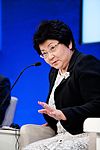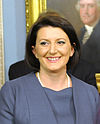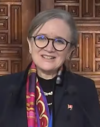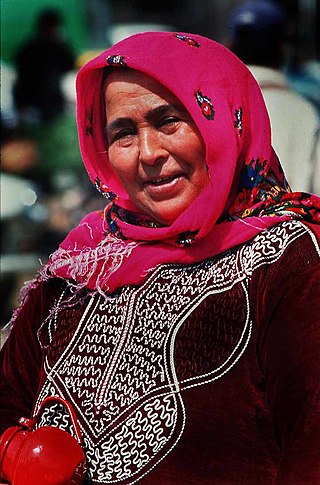
In modern usage, hijab generally refers to various head coverings conventionally worn by many Muslim women. It is similar to the tichel or snood worn by Orthodox Jewish women, certain headcoverings worn by some Christian women, such as the mantilla, apostolnik and wimple, as well as the dupatta worn by many Hindu and Sikh women. While a hijab can come in many forms, it often specifically refers to a headscarf, wrapped around the head, covering the hair, neck and ears, but leaving the face visible. The use of the hijab has been on the rise worldwide since the 1970s and is viewed by many Muslims as expressing modesty and faith. However, some Muslim scholars and activists argue that it is not mandated.

The Partition of India in 1947 was the change of political borders and the division of other assets that accompanied the dissolution of the British Raj in the Indian subcontinent and the creation of two independent dominions in South Asia: India and Pakistan. The Dominion of India is today the Republic of India, and the Dominion of Pakistan—which at the time comprised two regions lying on either side of India—is now the Islamic Republic of Pakistan and the People's Republic of Bangladesh. The partition was outlined in the Indian Independence Act 1947. The change of political borders notably included the division of two provinces of British India, Bengal and Punjab. The majority Muslim districts in these provinces were awarded to Pakistan and the majority non-Muslim to India. The other assets that were divided included the British Indian Army, the Royal Indian Navy, the Royal Indian Air Force, the Indian Civil Service, the railways, and the central treasury. Provisions for self-governing independent Pakistan and India legally came into existence at midnight on 14 and 15 August 1947 respectively.

Islam in Malaysia is represented by the Shafi‘i school of Sunni jurisprudence. Islam was introduced to Malaysia by traders arriving from Persia, Arabia, China and the Indian subcontinent. It became firmly established in the 15th century. In the Constitution of Malaysia, Islam is granted the status of "religion of the Federation" to symbolize its importance to Malaysian society, while defining Malaysia constitutionally as a secular state. Therefore, other religions can be practiced freely.
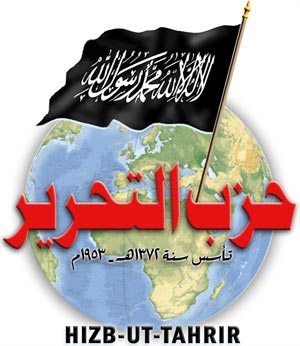
Hizb ut-Tahrir is an international pan-Islamist and Islamic fundamentalist political organization whose stated aim is the re-establishment of the Islamic caliphate to unite the Muslim community and implement sharia globally.
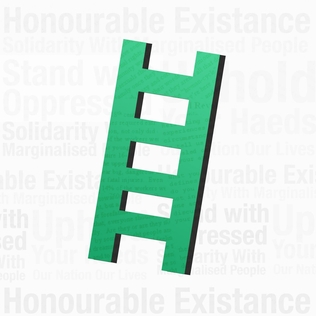
The Indian Union Muslim League is a political party primarily based in Kerala. It is recognised as a State Party in Kerala by the Election Commission of India.
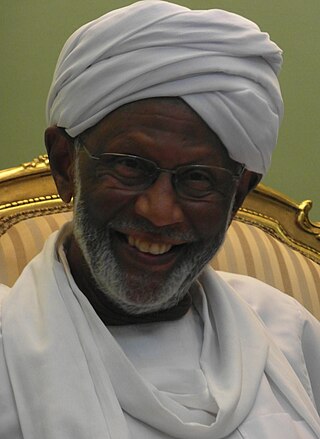
Hassan al-Turabi was a Sudanese politician and scholar. He was the alleged architect of the 1989 Sudanese military coup that overthrew Sadiq al-Mahdi and installed Omar al-Bashir as president. He has been called "one of the most influential figures in modern Sudanese politics" and a "longtime hard-line ideological leader". He was instrumental in institutionalizing Sharia in the northern part of the country and was frequently imprisoned in Sudan, but these "periods of detention" were "interspersed with periods of high political office".
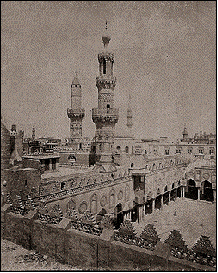
Islam is the dominant religion in Egypt, with approximately 89% of Egyptians identifying as Muslims. The majority of Egyptian Muslims are adherents of Sunni Islam, while a small minority adhere to Shia Islam. Since 1980, Islam has served as Egypt's state religion. Due to the lack of a religious census, owing to the alleged undercounting of non-Muslim minorities in Egyptian censuses, the actual percentage of Muslims is unknown; the percentage of Egyptian Christians, who are the second-largest religious group in the country, is estimated to be between 6% and 11% of the population.
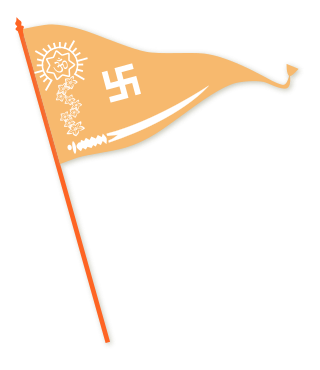
Akhil Bharat Hindu Mahasabha is a Hindu nationalist political party in India.
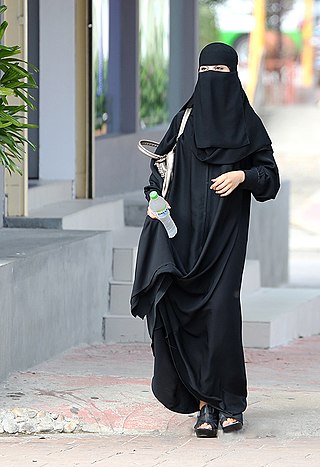
A niqāb or niqaab, also known as a ruband, is a long garment worn by some Muslim women in order to cover their entire body and face, excluding their eyes. It is an interpretation in Islam of the concept of hijab, and is worn in public and in all other places where a woman may encounter non-mahram men. Most prevalent in the Arabian Peninsula, the niqab is a controversial clothing item in many parts of the world, including in some Muslim-majority countries.
India since its independence in 1947 has been a secular state. The secular values were enshrined in the constitution of India. India's first prime minister Jawaharlal Nehru and Law Minister B.R Ambedkar is credited with the formation of secular values in the modern history of the country.

The Dominion of Pakistan, officially Pakistan, was an independent federal dominion in the British Commonwealth of Nations, existing between 14 August 1947 and 23 March 1956, created by the passing of the Indian Independence Act 1947 by the British parliament, which also created an independent Dominion of India.

The 2002 Gujarat riots, also known as the 2002 Gujarat violence, was a three-day period of inter-communal violence in the western Indian state of Gujarat. The burning of a train in Godhra on 27 February 2002, which caused the deaths of 58 Hindu pilgrims and karsevaks returning from Ayodhya, is cited as having instigated the violence. Following the initial riot incidents, there were further outbreaks of violence in Ahmedabad for three months; statewide, there were further outbreaks of violence against the minority Muslim population of Gujarat for the next year.

The Islamic State (IS), also known as the Islamic State of Iraq and the Levant (ISIL), the Islamic State of Iraq and Syria (ISIS) and by its Arabic acronym Daesh, is a transnational Salafi jihadist group and a former unrecognised quasi-state. Its origins were in the Jai'sh al-Taifa al-Mansurah organization founded by Abu Omar al-Baghdadi in 2004, which fought alongside al-Qaeda during the Iraqi insurgency. The group gained global prominence in 2014, when its militants successfully captured large territories in northwestern Iraq and eastern Syria, taking advantage of the ongoing Syrian civil war. By the end of 2015, it ruled an area with an estimated population of twelve million people, where it enforced its extremist interpretation of Islamic law, managed an annual budget exceeding US$1 billion, and commanded more than 30,000 fighters.
Movements for Muslim women to seek roles in national leadership have increased rapidly. Greater opportunities for women in education have further encouraged their involvement in politics. The most prominent Muslim female leaders are former prime minister of Pakistan Benazir Bhutto, Indonesian President Megawati Sukarnoputri (2001–2004), former Turkish Prime Minister Tansu Çiller (1993–1996), former Senegalese Prime Minister Mame Madior Boye (2001–2002), Bangladeshi Prime Ministers Khaleda Zia and Sheikh Hasina Wajed, former Iranian Vice President Masoumeh Ebtekar (1997–2005), former Malian Prime Minister Cissé Mariam Kaïdama Sidibé (2011–2012), Kosovan President Atifete Jahjaga (2011–2016), former President of Mauritius Ameenah Gurib (2015–2018), former President of Singapore Halimah Yacob (2017–2023) and current President of Tanzania Samia Suluhu Hassan

The king of Saudi Arabia, officially the king of the Kingdom of Saudi Arabia, is the monarch and head of state/head of government of the Kingdom of Saudi Arabia who holds absolute power. He is the head of the Saudi Arabian royal family, the House of Saud. The king is the supreme commander-in-chief of the Royal Saudi Armed Forces and the head of the Saudi national honors system. The king is called the "Custodian of the Two Holy Mosques", a title that signifies Saudi Arabia's jurisdiction over the mosques of Masjid al-Haram in Mecca and Al-Masjid an-Nabawi in Medina. The title has been used many times through the history of Islam. The first Saudi king to use the title was Faisal; however, King Khalid did not use the title after him. In 1986, King Fahd replaced "His Majesty" with the title of Custodian of the Two Holy Mosques, and it has been since used by both King Abdullah and King Salman. The king has been named the most powerful and influential Muslim and Arab leader in the world according to the Muslim 500.

The 500 Most Influential Muslims is an annual publication first published in 2009, which ranks the most influential Muslims in the world.

The Freedom and Justice Party is an Egyptian Islamist political party. The ex-president of the party, Mohamed Morsi, won the 2012 presidential election, and in the 2011 parliamentary election it won more seats than any other party. It is nominally independent, but has strong links to the Muslim Brotherhood of Egypt, the largest political group in Egypt. The party was banned and dissolved in 2014; however, it continues to function underground.








